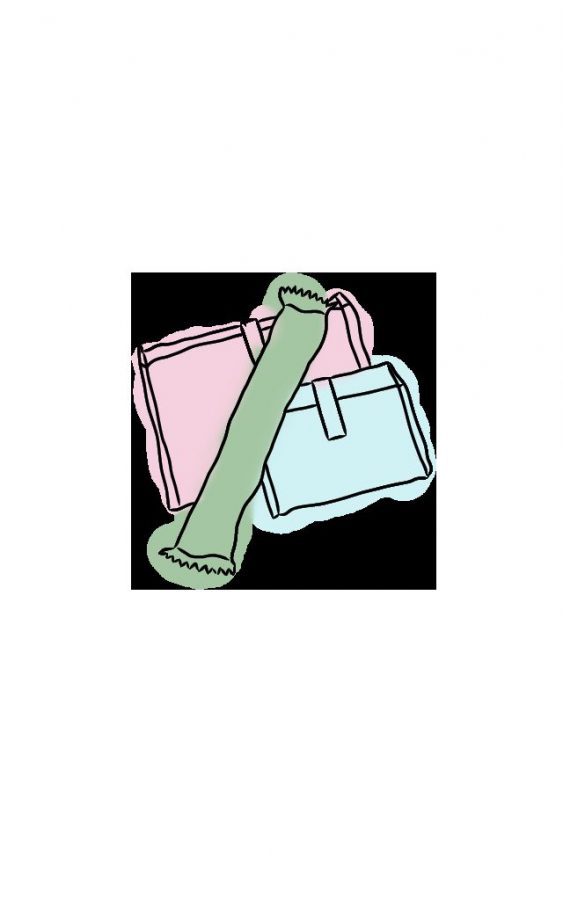Female students face the same dreaded moment every month.
Getting your period at school is a nightmare and a worry for your clothes and comfort. You know it’s coming, of course, it’s a cycle. You’re bound to get it at some point, but sometimes it just comes. You race to the bathroom. You weren’t expecting to get it today. Why today?! Why now?! You don’t have anything. In the corner, a metal box glints; you dart over, and it’s the dispenser — $0.25.
‘A quarter? For a tampon? Who has a quarter?!’ you think, jiggling the crank in a desperate attempt, panic bubbling and rising in your chest.
Another girl walks in, and you gawk at her, your mouth drying. You begin the question, the fear of judgement gripping in your stomach.
“Do you have anything?”
She knows exactly what you’re asking, and she shakes her head.
“No, sorry.” A hint of piteous understanding in her voice. But what now?
In the last two years, Trinity has seen the importance of preserving health on campus. With quick acting COVID-19 regulations, students are used to their health being protected by Trinity. But is it protected for all students?
We want to make our campus a safe, comfortable and healthy place for all students. This has been done in numerous ways, with policies like contact tracing, hall passes, security guards, and health and wellness classes. But we’re glossing over an important part of health for half of the population. Females can’t control whether or not they get their periods, and they shouldn’t be struggling to fix something they can’t control. Accessibility to period products would solve multiple avoidable problems for students who menstruate.
Female students are losing instructional time that males are not. If a female student is to get their period and forgets products, they’re expected to go to the nurse, and if a female student needs a product and has to travel all the way to the nurse’s office or the middle/upper school office, this takes a significantly larger amount of time rather than just going to the bathroom and having everything you need right there.
“We certainly want everyone to get through their day and not have to worry about your cycle, getting caught up in that, and have it be an issue for anybody,” school nurse Kelly White said.
“I’ve always made sure that the nursing budget had included enough that I could keep a couple bags of pads here,” White said. “I’ve got a box of tampons available here … especially as a teenager, your cycle can get irregular.”
But in almost every bathroom, there’s nothing. There’s an occasional $0.25 dispenser, but they aren’t regularly replenished with products and some don’t even work.
With the introduction of hall passes, products are even less accessible. Hall passes were introduced with the interest of safety for all students, and they’re required for going anywhere that isn’t the bathroom. If a student while in class realizes that they have gotten their period, they’ll have to request a hall pass to go to the nurse to get a pad or tampon. This introduces a layer of discomfort for students. For those requesting a hall pass for the nurse from a male teacher, this can be especially uncomfortable.
“I don’t think a student is obligated to tell a teacher why they need to come see me,” White said. “If they need to see the nurse, they need to see the nurse.”
Recently, the Diversity Club has worked to fix this problem, but it’s not yet a permanent solution. The Diversity Club held a period product drive and put plastic decorated shoeboxes filled with pads, tampons and chocolate in the bathrooms. However, this is only a temporary solution. The “take one, leave one” policy Diversity Club is enacting can only work for so long. Eventually, they will deplete as people forget, and the initiative will end.
Eventually, the products will run out. People will forget to fill them, and students will find themselves stranded and at square one once again. This is why the school needs to provide these products in more readily available places for female students, such as the bathroom. If these products could be found in bathrooms and not just in the nurse’s office, this will also minimize the length of time students will be gone from class.
“You’re in a situation where you’re already leaving class or using time because it’s not readily available,” Parker said.
This initiative has already been started by Diversity Club; all the student body needs to do is finish it. Installing permanent cabinets with an ever-refreshed supply of products for female students to access would be a great way to address the health of all students.
Students spend several hours a day on campus, and they need to be kept healthy while they’re here. These students who menstruate can’t just go without the proper products. The solution is fairly simple, especially compared to other issues on campus. It’s just a matter of actually doing it.
This topic shouldn’t be viewed as “taboo,” but it often is. Since males don’t experience this, females have often felt the need to be quiet on the topic.
“I feel like it’s still such a taboo conversation, especially in middle school where it’s also new and uncomfortable,” English teacher Hannah Parker said.
The only time you really talk about the menstrual cycle in school is during a health and wellness course. In most schools, that really only occurs once or twice, not nearly enough for everyone to understand that it’s normal and natural.
“I just think that there should be more discussions to normalize periods,” Diversity Club officer Leah Keefe said.
But for the half of the population who do menstruate, they have to deal with the awkwardness of it every single month, and without adequate products, it is even more difficult.
“I think just bring in products for the drive and be respectful of the boxes in the restrooms,” Keefe said. “And if you see it empty, maybe bring in some pads and tampons. Somebody might need them, and periods are normal. Just know that yours is normal, and other people’s are normal and you shouldn’t make it weird.”
Health and wellness should be a consistent priority on campus. It shouldn’t just be the most obvious things that are taken care of, like soap and toilet paper. Menstruation is normal, and it should be treated as such. All aspects of health and wellness needs to be addressed, from bandaids in the nurse’s office to pads and tampons in the bathroom.

















